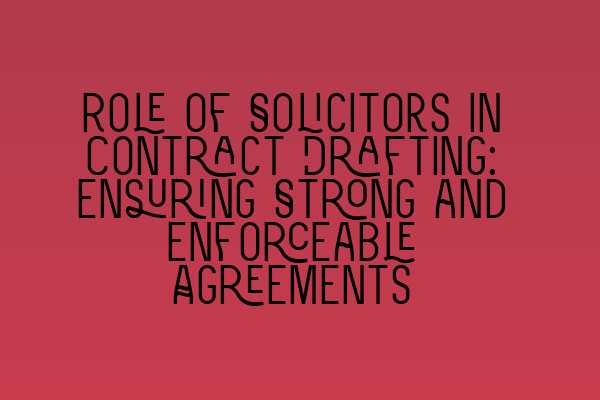When it comes to contract law, solicitors play a crucial role in ensuring that agreements are strong and enforceable. Contract drafting requires careful attention to detail, expertise in legal principles, and the ability to anticipate potential issues and risks. In this blog post, we will explore the role of solicitors in contract drafting and how they contribute to the creation of robust and legally binding agreements.
The Importance of Strong and Enforceable Agreements
Before diving into the specifics of a solicitor’s role in contract drafting, let’s first understand why strong and enforceable agreements are essential. A contract is a legally binding agreement between parties, outlining their respective rights and obligations. It provides clarity and certainty, reducing the likelihood of disputes and misunderstandings.
Without a well-drafted contract, parties may find themselves in complex legal battles, resulting in financial losses and damaged relationships. A strong and enforceable contract helps protect the interests of all parties involved and ensures that they have a clear understanding of their rights and responsibilities.
The Role of Solicitors in Contract Drafting
Solicitors are legal professionals who specialize in various areas of law, including contract law. Their role in contract drafting is paramount, as they are well-versed in the legal principles and best practices necessary for creating robust agreements.
1. Legal Expertise and Advice: Solicitors have in-depth knowledge of contract law and the legal framework surrounding contracts. They can provide expert advice on the drafting process, ensuring that the agreement aligns with legal requirements and addresses any potential legal issues.
2. Customized Contract Creation: Every contract is unique, and solicitors understand the importance of tailoring the agreement to the specific needs and circumstances of the parties involved. They have the skills to draft customized clauses, considering factors such as the nature of the contract, industry-specific regulations, and individual client requirements.
3. Risk Assessment and Mitigation: Solicitors are adept at identifying potential risks and pitfalls that may arise during the course of the contract. They can conduct a thorough risk assessment and provide guidance on how to mitigate those risks through robust contractual provisions and dispute resolution mechanisms. By addressing these risks proactively, solicitors help protect their clients’ interests and minimize the likelihood of disputes.
4. Clear and Precise Language: Contractual terms and language can often be complex and confusing. Solicitors excel at translating legal jargon into clear and understandable language, ensuring that all parties have a comprehensive understanding of their rights and obligations. Clear and precise contract language helps avoid misunderstandings and ambiguities that can lead to disputes.
5. Negotiation Support: Solicitors provide valuable assistance during contract negotiations. They can advocate on behalf of their clients, ensuring that their interests are protected and that they achieve the best possible outcome. Solicitors are skilled negotiators, adept at striking a balance between parties’ interests while safeguarding their clients’ rights.
6. Continuous Legal Support: Once a contract is drafted and executed, solicitors continue to provide legal support throughout the contract’s lifespan. They can offer guidance on interpreting contractual provisions, handling amendments, and resolving any disputes that may arise. Solicitors are committed to ensuring that their clients’ contractual rights are enforced and protected.
Conclusion
In conclusion, solicitors play a pivotal role in contract drafting. Their expertise and understanding of contract law, risk assessment, and negotiation skills are essential in creating strong and enforceable agreements. Solicitors provide valuable guidance throughout the process, from customized contract creation to continuous legal support. By investing in a solicitor’s services, individuals and businesses can ensure that their contracts are legally sound, protecting their rights and minimizing the likelihood of disputes.
If you’re interested in learning more about contract law and preparing for the SQE exams, we recommend checking out our related articles:
